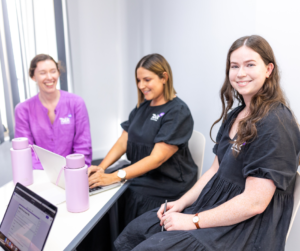What is Childhood Apraxia of Speech (CAS)?
CAS is a motor speech disorder that affects a child’s ability to plan and program the movements required for speech. Unlike other speech disorders, CAS involves a disconnect between the brain and the muscles used for speaking, making it challenging for the child to produce sounds correctly and consistently. Diagnosis of CAS occurs when all three of these features are present:
- Inconsistency across words and syllables
- Lengthened and disrupted movements between speech sounds
- Inappropriate prosody
CAS is life-long and is diagnosed by a qualified and appropriately experienced speech pathologist, not a medical doctor. A thorough assessment is vital in diagnosing it accurately and developing an effective treatment plan.
Childhood Apraxia of Speech (CAS) Assessment
As paediatric speech pathologists at TalkHQ, we have a special interest in helping children with speech sound disorders. When a client presents with characteristics that might indicate Childhood Apraxia of Speech (CAS), we conduct a thorough three-part assessment process. This allows us to use clinical reasoning to develop effective, evidence-based treatment plans.
Our goal is to ensure that every child receives the most accurate diagnosis and the best possible therapy. Here are four components of our assessment process to support the diagnosis of CAS.
1. Speech Sample During Play
Why is this important?
Assessing a child’s speech during play provides a comprehensive view of their speech abilities beyond single words. This method helps identify any CAS characteristics that are present in the child’s natural interactions. Observing the child in play allows us to pinpoint specific sounds and patterns that may need targeted therapy. It also helps observe their prosody, which is a key feature to look for when assessing the presence of CAS.
2. Articulation and Phonology Assessment
Why assess this?
It is important to assess the nature of a child’s speech errors to help determine therapy targets. Children with CAS often exhibit unique phonological processes, including vowel errors and inconsistent productions. Useful assessments include the Diagnostic Evaluation of Articulation and Phonology – Inconsistency Subtest (Dodd et al, 2002) or the Nuffield Dyspraxia Programme (NDP3) Assessment (Williams & Stephens, 2009). These assessments help distinguish between motor-based errors and phonological issues.
3. Structural/Functional Assessment
Why is this critical?
It is important to complete a comprehensive oral musculature, structural and functional evaluation. An oral motor examination (OME) evaluates the range, strength, and coordination of the lips and tongue, which is vital in identifying CAS. At TalkHQ, we love using Adventures in Speech Pathology’s oral motor exam assessment cards. By observing tasks like kissing, coughing, and blowing, we can assess the sequencing of motor movements and rule out other conditions like dysarthria. This examination helps confirm whether a structural or functional issue is contributing to the speech disorder.
4. Motor Speech Examination
Recommended Tool: DEMSS (Dynamic Evaluation of Motor Speech Skill) Why choose DEMSS?
As CAS is a motor speech disorder, it is important to examine the motor speech aspects using the appropriate tools. At TalkHQ, our speech pathologists use either the Dynamic Evaluation of Motor Speech Skill (DEMSS) (Strand & McCauley, 2019) or the Nuffield Dyspraxia Programme (NDP3) Assessment (Williams & Stephens, 2009). These assessments provide both qualitative and quantitative insights into the child’s motor speech disorder. These diagnostic tools not only confirm the presence of CAS but also assess its severity. Understanding the severity helps the speech pathologist to tailor the intensity and type of intervention required.
At TalkHQ, we rely on these comprehensive assessments to ensure accurate diagnosis and effective treatment planning for children suspected of having CAS. This evidence-based approach allows us to provide the highest standard of care and support to our clients.
For more information on our services or to schedule an assessment, visit TalkHQ.







